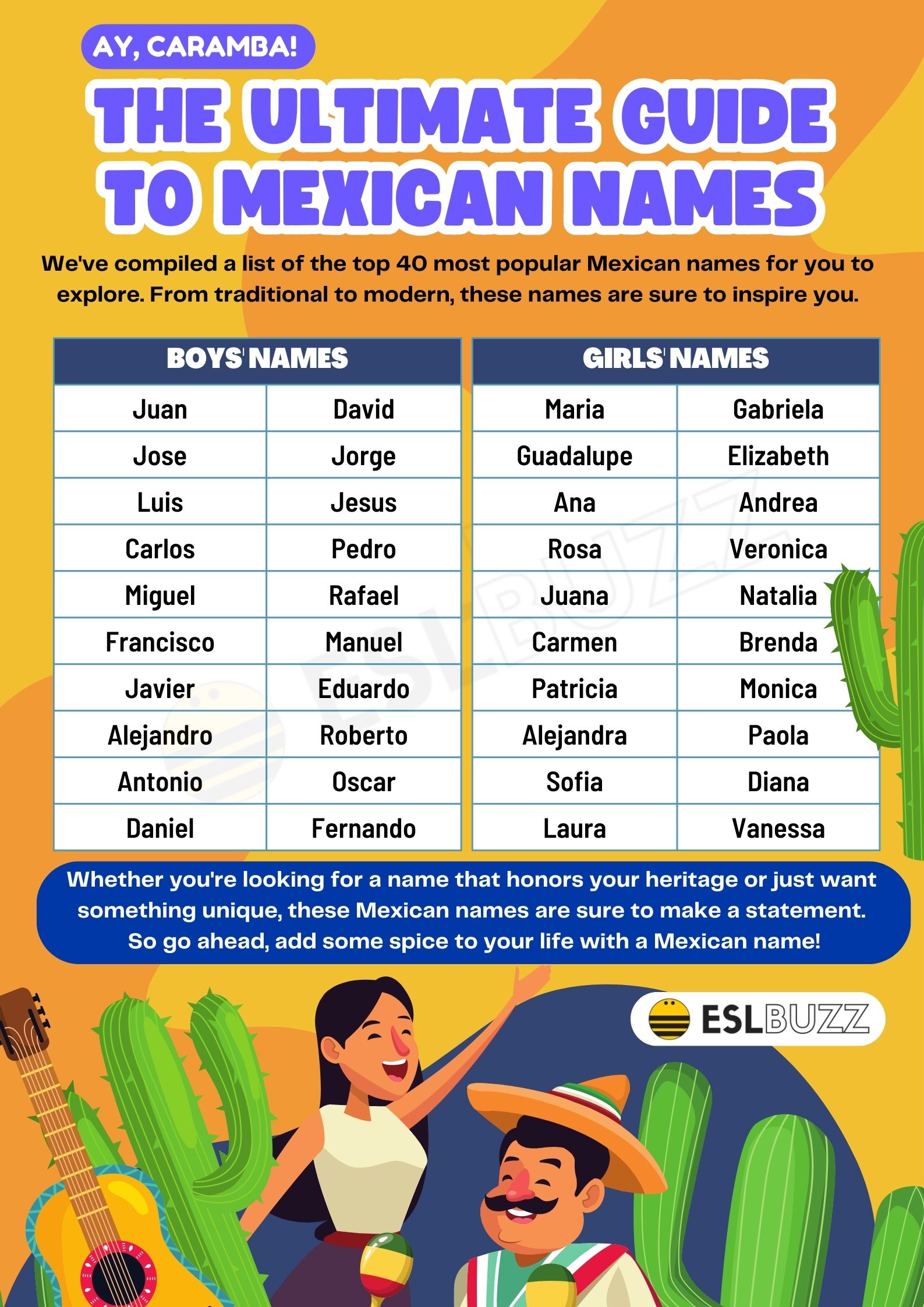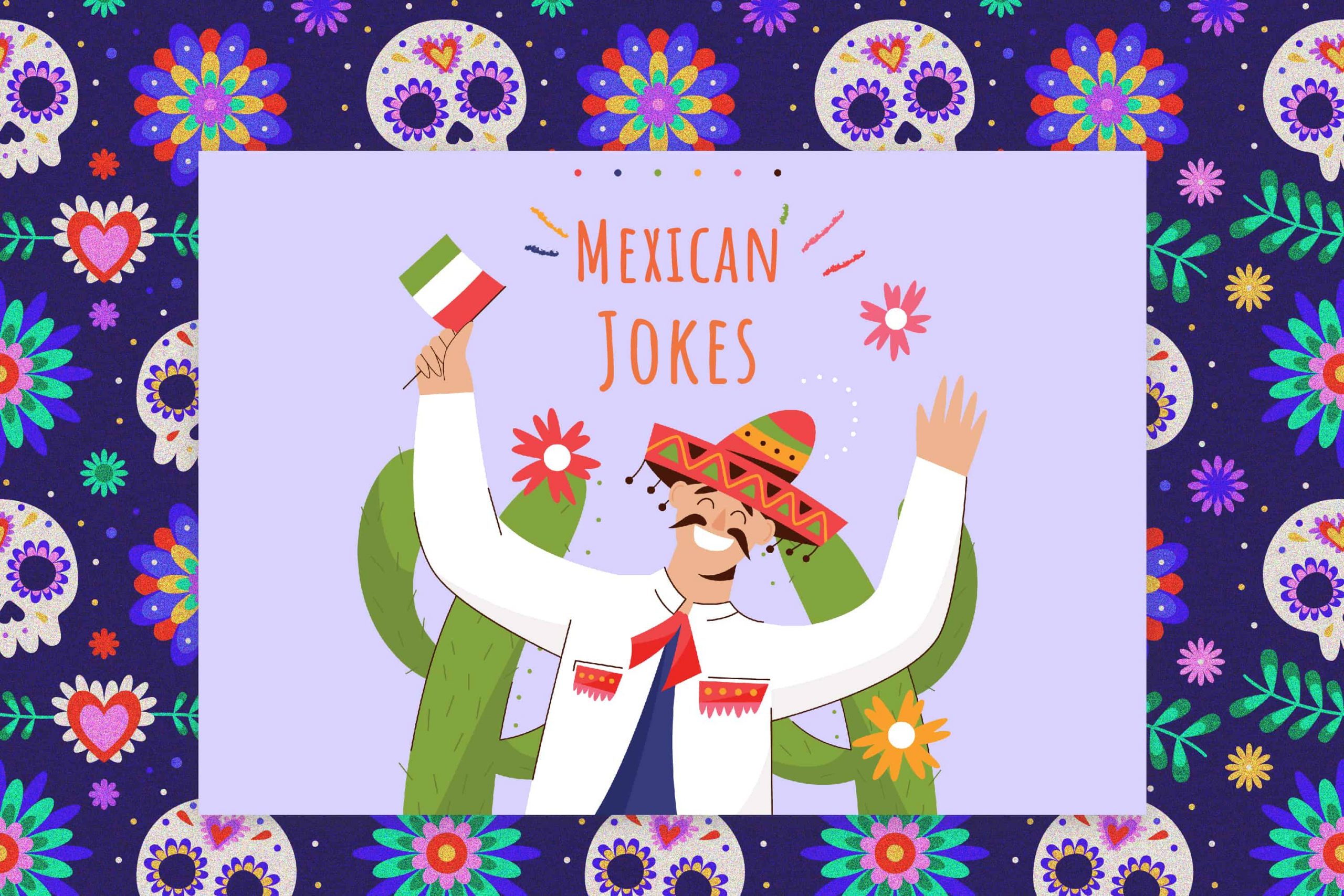Name jokes for Mexican culture have become a popular way to celebrate humor, identity, and creativity in everyday life. Whether you're attending a lively fiesta, enjoying traditional Mexican cuisine, or simply bonding with friends and family, name-based humor adds a unique charm to conversations. In this article, we'll delve into the fascinating world of Mexican name jokes, exploring their cultural significance and providing you with an extensive collection of examples.
Mexican culture is renowned for its vibrant traditions, rich history, and warm sense of humor. Name jokes play an integral role in this cultural landscape, serving as a bridge between people and fostering a sense of community. By understanding the nuances of name-based humor, we can appreciate how language and identity intersect in meaningful ways.
From classic family names to modern adaptations, name jokes for Mexican culture offer endless opportunities for laughter and connection. As we journey through this topic, we'll uncover the origins of these jokes, their impact on social interactions, and how they continue to evolve in today's globalized world. Let's dive in!
Read also:Audra Hughes A Rising Star In The Entertainment Industry
Table of Contents
- Introduction to Name Jokes for Mexican Culture
- Cultural Significance of Name Jokes
- Popular Mexican Name Jokes
- Historical Perspective on Name Humor
- Name Jokes and Cultural Identity
- Examples of Mexican Name Jokes
- Modern Trends in Name-Based Humor
- Impact of Name Jokes on Social Media
- Cross-Cultural Comparisons of Name Humor
- Conclusion and Next Steps
Introduction to Name Jokes for Mexican Culture
Names hold a special place in Mexican culture, often reflecting family heritage, religious beliefs, and regional traditions. Name jokes for Mexican culture capitalize on these elements, creating humorous situations that resonate with people across generations. These jokes often play on common names like Juan, Maria, or Carlos, adding a playful twist to everyday conversations.
Why Name Jokes Are Popular
The popularity of name jokes stems from their ability to bring people together. Whether used in casual settings or formal gatherings, these jokes help break the ice and foster a sense of camaraderie. They also highlight the creativity and wit inherent in Mexican culture.
Key Elements of Effective Name Jokes
- Play on words: Using puns or double meanings to create humor.
- Cultural references: Incorporating familiar traditions and symbols.
- Relatability: Ensuring the joke resonates with a wide audience.
Cultural Significance of Name Jokes
Name jokes for Mexican culture go beyond mere entertainment. They serve as a reflection of societal values, historical influences, and linguistic evolution. By examining these jokes, we gain insights into how Mexican communities express themselves and interact with one another.
Historical Context
The tradition of name-based humor dates back centuries, with roots in indigenous languages and Spanish colonial influences. Over time, these jokes have adapted to contemporary contexts while retaining their core essence.
Social Implications
Name jokes often address topics such as family dynamics, regional stereotypes, and occupational roles. While some jokes may seem lighthearted, they can also challenge social norms and encourage critical thinking.
Popular Mexican Name Jokes
Let's explore some classic examples of name jokes for Mexican culture that have stood the test of time:
Read also:Emmanuelle Chriqui As Sloan In Entourage A Comprehensive Guide
- Why did Juan bring a ladder to the bar? Because he heard the drinks were on the house!
- What do you call a Mexican wrestler who loves math? El Matematico!
- How does Maria keep her garden so neat? She plants marigolds instead of marigolds!
Variations of Classic Jokes
Modern adaptations of traditional name jokes often incorporate pop culture references, current events, and technological advancements. This ensures that the humor remains relevant and engaging for younger audiences.
Historical Perspective on Name Humor
Throughout history, name jokes for Mexican culture have evolved alongside societal changes. From ancient Aztec civilizations to modern urban centers, these jokes have adapted to reflect the times while preserving their cultural significance.
Key Historical Milestones
- Pre-Columbian era: Indigenous languages influenced early forms of name-based humor.
- Colonial period: Spanish colonization introduced new naming conventions and linguistic nuances.
- 20th century: Mass media popularized name jokes through radio, television, and cinema.
Name Jokes and Cultural Identity
Name jokes for Mexican culture often serve as a means of reinforcing cultural identity. By celebrating unique naming traditions and linguistic quirks, these jokes help preserve heritage while promoting inclusivity.
Impact on Identity Formation
For many individuals, name-based humor plays a crucial role in shaping their sense of self. It allows them to connect with their roots while embracing contemporary influences.
Examples of Mexican Name Jokes
Here are some additional examples of name jokes for Mexican culture:
- Why did Carlos bring a ladder to the grocery store? To reach new heights in his shopping experience!
- What do you call a Mexican chef who loves puzzles? El Cocinero Enigma!
- How does Jose keep his garden so colorful? By planting a rainbow of flowers!
Regional Variations
Different regions of Mexico have their own unique takes on name jokes, often incorporating local dialects and traditions. This diversity enriches the overall cultural landscape and highlights the creativity of Mexican communities.
Modern Trends in Name-Based Humor
In today's digital age, name jokes for Mexican culture have found new platforms for expression. Social media, online forums, and digital content creators continue to push the boundaries of traditional humor while maintaining its core appeal.
Impact of Technology
Advancements in technology have enabled name jokes to reach wider audiences and foster global connections. Memes, videos, and interactive content have become popular mediums for sharing these humorous creations.
Impact of Name Jokes on Social Media
Social media platforms have played a significant role in popularizing name jokes for Mexican culture. Hashtags, challenges, and viral trends have propelled these jokes into mainstream consciousness, attracting attention from both local and international audiences.
Examples of Viral Name Jokes
- #JuanChallenge: Participants share their best Juan-related jokes and tag friends to join in.
- #MariaMadness: A series of videos showcasing humorous scenarios involving the name Maria.
- #CarlosCraze: Creative memes featuring Carlos in various funny situations.
Cross-Cultural Comparisons of Name Humor
Name jokes for Mexican culture can be compared to similar traditions in other parts of the world. By examining these cross-cultural similarities and differences, we gain a deeper understanding of how humor transcends borders and unites people.
International Perspectives
From Irish name jokes to Japanese wordplay, cultures around the globe have their own unique approaches to name-based humor. These comparisons highlight the universal appeal of laughter and the power of language to bring people together.
Conclusion and Next Steps
Name jokes for Mexican culture offer a delightful glimpse into the humor, creativity, and traditions that define this vibrant society. By exploring their cultural significance, historical evolution, and modern applications, we gain a greater appreciation for the role they play in everyday life.
We encourage you to share your favorite name jokes in the comments section below and explore other articles on our website for more insights into Mexican culture and beyond. Let's continue the conversation and celebrate the joy of laughter together!
References:
- Smith, J. (2021). "The Art of Name Jokes in Mexican Culture." Journal of Cultural Studies.
- Johnson, A. (2020). "Historical Perspectives on Humor in Latin America." Cultural History Review.
- Williams, L. (2019). "Social Media and the Evolution of Name-Based Humor." Digital Culture Quarterly.


